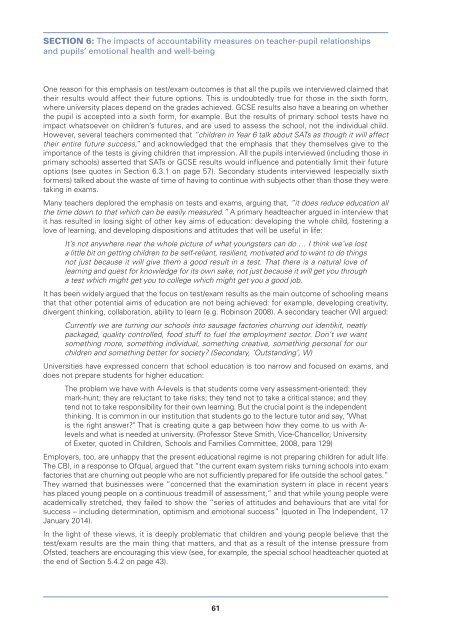exam-factories
exam-factories
exam-factories
You also want an ePaper? Increase the reach of your titles
YUMPU automatically turns print PDFs into web optimized ePapers that Google loves.
SECTION 6: The impacts of accountability measures on teacher-pupil relationshipsand pupils’ emotional health and well-beingOne reason for this emphasis on test/<strong>exam</strong> outcomes is that all the pupils we interviewed claimed thattheir results would affect their future options. This is undoubtedly true for those in the sixth form,where university places depend on the grades achieved. GCSE results also have a bearing on whetherthe pupil is accepted into a sixth form, for <strong>exam</strong>ple. But the results of primary school tests have noimpact whatsoever on children’s futures, and are used to assess the school, not the individual child.However, several teachers commented that “children in Year 6 talk about SATs as though it will affecttheir entire future success,” and acknowledged that the emphasis that they themselves give to theimportance of the tests is giving children that impression. All the pupils interviewed (including those inprimary schools) asserted that SATs or GCSE results would influence and potentially limit their futureoptions (see quotes in Section 6.3.1 on page 57). Secondary students interviewed (especially sixthformers) talked about the waste of time of having to continue with subjects other than those they weretaking in <strong>exam</strong>s.Many teachers deplored the emphasis on tests and <strong>exam</strong>s, arguing that, “it does reduce education allthe time down to that which can be easily measured.” A primary headteacher argued in interview thatit has resulted in losing sight of other key aims of education: developing the whole child, fostering alove of learning, and developing dispositions and attitudes that will be useful in life:It’s not anywhere near the whole picture of what youngsters can do … I think we’ve losta little bit on getting children to be self-reliant, resilient, motivated and to want to do thingsnot just because it will give them a good result in a test. That there is a natural love oflearning and quest for knowledge for its own sake, not just because it will get you througha test which might get you to college which might get you a good job.It has been widely argued that the focus on test/<strong>exam</strong> results as the main outcome of schooling meansthat that other potential aims of education are not being achieved: for <strong>exam</strong>ple, developing creativity,divergent thinking, collaboration, ability to learn (e.g. Robinson 2008). A secondary teacher (W) argued:Currently we are turning our schools into sausage <strong>factories</strong> churning out identikit, neatlypackaged, quality controlled, food stuff to fuel the employment sector. Don’t we wantsomething more, something individual, something creative, something personal for ourchildren and something better for society? (Secondary, ‘Outstanding’, W)Universities have expressed concern that school education is too narrow and focused on <strong>exam</strong>s, anddoes not prepare students for higher education:The problem we have with A-levels is that students come very assessment-oriented: theymark-hunt; they are reluctant to take risks; they tend not to take a critical stance; and theytend not to take responsibility for their own learning. But the crucial point is the independentthinking. It is common in our institution that students go to the lecture tutor and say, "Whatis the right answer?" That is creating quite a gap between how they come to us with A-levels and what is needed at university. (Professor Steve Smith, Vice-Chancellor, Universityof Exeter, quoted in Children, Schools and Families Committee, 2008, para 129)Employers, too, are unhappy that the present educational regime is not preparing children for adult life.The CBI, in a response to Ofqual, argued that “the current <strong>exam</strong> system risks turning schools into <strong>exam</strong><strong>factories</strong> that are churning out people who are not sufficiently prepared for life outside the school gates.”They warned that businesses were “concerned that the <strong>exam</strong>ination system in place in recent yearshas placed young people on a continuous treadmill of assessment,” and that while young people wereacademically stretched, they failed to show the “series of attitudes and behaviours that are vital forsuccess – including determination, optimism and emotional success” (quoted in The Independent, 17January 2014).In the light of these views, it is deeply problematic that children and young people believe that thetest/<strong>exam</strong> results are the main thing that matters, and that as a result of the intense pressure fromOfsted, teachers are encouraging this view (see, for <strong>exam</strong>ple, the special school headteacher quoted atthe end of Section 5.4.2 on page 43).61


